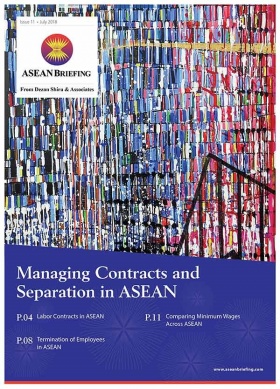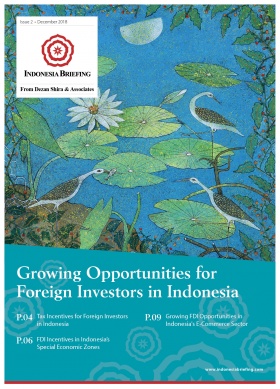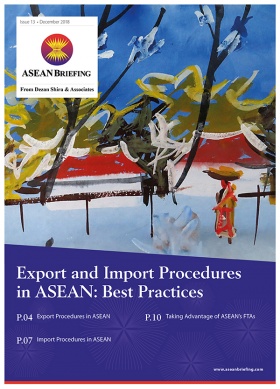Trade War Incentive Schemes in ASEAN
- ASEAN members have issued a variety of incentives to attract investors affected by the US-China trade war.
- These incentives come in the form of tax breaks as well as initiatives to improve the investment climate.
- Investors should seek the help of registered advisors to better understand which incentives are beneficial for their business.
Governments across ASEAN have been unveiling an array of incentive packages to entice businesses affected by the US-China trade war.
Countries such as Thailand, the Philippines, Malaysia, and Indonesia have introduced tax breaks and initiatives to improve the ease of doing business whereas Vietnam, Singapore, and Cambodia have accelerated business reforms, such as executing free trade agreements (FTAs), and double taxation agreements (DTAs).
We consolidate and briefly discusses the development of each country’s incentives over the past year. The developments showcase how ASEAN members are distinguishing themselves from the fellow competition and what opportunities are available for investors looking elsewhere in Asia.
Thailand Plus
Thailand introduced a stimulus package called Thailand Plus that covers seven key points which include the introduction of new tax incentives and deductions.
Thailand already offers investors corporate income tax (CIT) exemptions through the Eastern Economic Corridor, but Thailand Plus allows companies to be eligible for further reductions if they invest at least 1 billion Bhat (US$32 million) and apply for the incentive before 2020.
Investors that are developing advanced technology, engaging in automation systems, or employ highly-skilled individuals in the fields of science, technology, engineering, and mathematics (STEM), can receive tax deductions of up to 200 percent.
Additionally, the government will amend the main law regulating foreign business activities to simplify the process of acquiring visas and work permits and to improve information sharing between the government and relevant state agencies.
Thailand will endeavor to expand its FTA network under Thailand Plus, reviving the Thailand-EU FTA and joining the Comprehensive and Progressive Agreement for Trans-Pacific Partnership (CPTPP). Moreover, special investment zones for companies from South Korea, Japan, China, and the US will be developed.
Foreign investors with a foothold in the country, especially in high-value manufacturing sectors like electronics, automotive, aerospace, and maintenance, repair, and overhaul (MRO) services, could benefit from this latest package.
The Philippines’ CITIRA, and legislative amendments
In September 2019, the Philippines introduced the Corporate Income Tax and Incentives Rationalization Act (CITIRA). CITIRA will gradually reduce CIT from 30 percent to 20 percent over a ten-year period as well as rationalize specific tax incentives. The current CIT of 30 percent is the highest in ASEAN.
The Act is the second phase of the government’s Comprehensive Tax Reform Package program and aims to increase foreign investment, stimulate job growth, and enable domestic small and medium-sized enterprises (SMEs) to be more regionally competitive.
Under CITIRA, the government will also develop new priority regions beyond the National Capital Region, Metro Manila. Investments outside this region could help the country develop its infrastructure and supply chains to compete more readily with other ASEAN countries.
To further encourage foreign investment, lawmakers amended two provisions of the Foreign Investment Act (FIA) of 1991.
The amendments include the removal of the ‘practice of professions’ from the foreign investment negative list (FINL). This was done to attract more skilled foreign professionals. The other amendments aim to reduce the number of mandatory direct local hires by foreign investors from 50 to 15 and to allow foreign investors to have 100 percent ownership of SMEs.
The government also revized the Public Service Act and the Retail Trade Liberalization Act. The formerly opened utility sectors like telecommunications and transportation to foreign investors. The latter set the minimum paid-up capital at US$200 thousand for foreign businesses looking to invest in the country’s retail industry.
Malaysia’s budget, investment fast track
Malaysia’s 2020 budget focused on tax incentives and grants to attract investments from multinational companies, particularly from China.
The target of the incentives is Fortune 500 companies dealing with high-end technology, manufacturing, or value-added industries. Qualifying companies will need to invest at least 5 billion Ringgits (US$1.1 billion) into Malaysia. In return, the government will make available 1 billion Ringgits (US$238 million) in incentives over five years.
Moreover, Malaysia will establish a specific channel to cater to Chinese investors and has set up a panel to fast-track investments for US and Chinese businesses looking to move operations out of China.
A ten-year tax exemption is being instituted for investors in the electronics and electrical industry, particularly investors in select knowledge-based services.
Additionally, the budget provides a grant to develop the digital economy. The goal is to advance the industry through the introduction of new technology, re-training of the local workforce, and the development of new electronics and electrical subsectors. Incentives are also available for businesses to implement automation into their practices.
Indonesia’s tax incentives
Indonesia introduced GR 45/2019, laying out a host of tax incentives for businesses that invest in labour-intensive industries, training programs, and research and development (R&D).
The regulation expanded on the previous legislation’s criteria regarding taxpayers eligible to receive tax incentives irrespective of industry. The move aims to garner further foreign investment, expand the skilled labor base, and advance diverse industries.
GR 45/2019 can be particularly advantageous for foreign companies looking to establish a manufacturing base in Indonesia for areas such as textiles, commodities, and services.
Taxpayers that engage in R&D initiatives can receive a tax facility of 300 percent in gross income reduction of total costs incurred. This incentive is designed to encourage more companies to generate innovation and shift to more high technology industries and products.
Indonesia is preparing another incentive for 2021 in the form of reducing its CIT rate from 25 percent to 20 percent.
Vietnam
The reshaping of the global supply chain has largely benefited Vietnam compared to other ASEAN countries.
Vietnam offers competitive costs, low wages, developed infrastructure, and tax incentives for numerous industries. The combination of these factors, as well as the country’s close proximity to China, has enabled the former to emerge as the main winner of the US-China trade war without the need to offer any further incentives.
Still, the government has strived to make it easier and more profitable to do business in Vietnam, and its economic development more sustainable. Recently, the government issued a decree providing science and technology enterprises with preferential treatment ranging from corporate tax cuts and exemptions to credit incentives, and exemptions or reductions in land and water surface lease fees. Besides this, the government is prioritizing investments in IT with labor and tax incentives.
The government also announced a plan to privatize state-owned enterprises by equitizing and divesting state capital from hundreds of enterprises by 2020. This move presents an opportunity for investors in sectors like agriculture and forestry, where Vietnam holds a comparative advantage to its ASEAN neighbors due to low labor costs.
In terms of special economic zones (SEZs), Vietnam has begun expanding its development zone policy and these zones offer their own incentives from free tariffs to low personal income tax.
Lastly, the country has signed FTAs with the Eurasian Economic Union (EAEU) and recently with the EU. The latter coincides with the Vietnam-EU Comprehensive Partnership and Cooperation Framework Agreement which will deepen economic and investment ties.
Singapore
Singapore has one of the world’s most business and investor-friendly tax regimes, a transparent common law legal system, followed by efficient and cost-effective procedures for incorporating a company.
These factors will continue to make the country the ideal destination for foreign investors seeking to expand into ASEAN and Asia.
Similar to Vietnam, Singapore already stands out from most ASEAN countries and does not need to develop trade war schemes per se because of the framework it has built over the years.
Singapore’s corporate tax incentives include:
- A wage credit scheme;
- Exemptions for start-ups;
- Partial tax exemption schemes;
- Investment allowance;
- Industry-specific incentives;
- Enterprise finance schemes;
- Double tax deductions;
- Incentives for pioneer industries; and
- Merger and acquisition schemes.
Singapore has been successful in pursuing FTA and DTA initiatives as part of its investment push. Although its ASEAN neighbors have strong FTA and DTA networks, these are not as extensive as Singapore’s which cover 85 DTAs and 24 FTAs.
An FTA with the EAEU was recently signed which will help to facilitate Russian investments into Asia. Additionally, earlier this year the EU ratified and approved an FTA it signed with Singapore, alongside two other agreements – the EU-Singapore Investment Protection Agreement and the EU-Singapore Partnership and Cooperation Agreement.
In October 2019, Singapore and China upgraded its existing FTA. The amended FTA covers cooperation in six areas including investments, with both countries agreeing to offer each other high levels of investment protection, strengthening their economic relationship.
The trade war has also intensified the debate on whether Singapore or Hong Kong is the leading financial hub in Asia.
In addition to having more FTAs and DTAs than Hong Kong, Singapore offers investors a diverse business community with over 7,000 multinational firms operating from the country. Furthermore, Singapore is uniquely positioned as being the gateway to the fastest growing economies in Southeast Asia.
The rest of ASEAN and the RCEP
Other ASEAN countries – Brunei, Cambodia, Laos, Myanmar – have not enacted specific trade war schemes, but have begun to take some steps to attract foreign investment.
Myanmar has discussed wooing more foreign investment from the spillover of the trade war as its regional neighbor Vietnam could face capacity constraints and underdeveloped infrastructure.
More substantially, Cambodia has ratified an agreement of double taxation avoidance and the prevention of fiscal evasion regarding income tax with Hong Kong. The country has also ratified DTAs with other countries in the region, including Singapore, China, Thailand, Vietnam, Brunei, and Indonesia.
Cambodia is pursuing further reforms as part of its Industrial Development Policy, including structural and industrial diversification (incentives are being provided for non-garment manufacturing companies), reforms to cut business costs and strengthen the logistics sector, and developing the digital economy.
Regionally, all ASEAN countries are aiming to sign the Regional Comprehensive Economic Partnership (RCEP) agreement next year. The RCEP would be the world’s largest trade deal and comprise of ASEAN’s trading partners Australia, New Zealand, China, Japan, and South Korea.
It would also boost commerce across the group by lowering tariffs, standardize custom rules and procedures, and expand market access; helping members to mitigate the negative impact being felt from the US-China trade war.
About Us
ASEAN Briefing is produced by Dezan Shira & Associates. The firm assists foreign investors throughout Asia and maintains offices throughout ASEAN, including in Singapore, Hanoi, Ho Chi Minh City and Jakarta. Please contact us at asia@dezshira.com or visit our website at www.dezshira.com.







